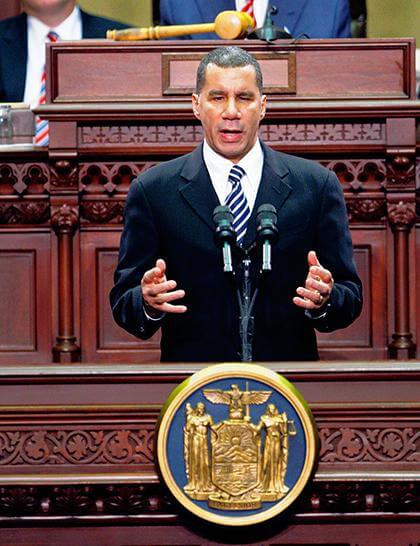By Jeremy Walsh
Gov. David Paterson was slated to plunge ahead with a dramatic state ethics reform package Wednesday, calling for a revamp to the state Legislature’s oversight commission, public campaign finance for state elections and term limits for state elected officials.
But it remained unclear how much of the package was practical after Paterson staffers told reporters in a conference call Tuesday that the governor had not discussed the most recent version of the reform bill with either the state Senate or state Assembly.
“We’re looking forward to sitting down and talking with both the Senate and Assembly regarding the Reform in Albany Act,” Paterson secretary Larry Schwartz said. “I don’t think we’re here to make trades. I think this legislation is to restore the trust and confidence that the people of this state want and need in their state government.”
The previous ethics reform bill was being discussed in the Senate when state Sens. Pedro Espada (D-Bronx) and Hiram Monserrate (D-East Elmhurst) overturned the Democratic majority by siding with Republicans, ushering in a monthlong legislative stalemate. Senate Republicans blocked the bill when it came to a vote in September.
The new bill would revamp the much-maligned Public Integrity Commission, cutting its size from 13 to five and altering the rules so that elected officials would only appoint a panel that would independently select commission members.
The bill would place the new ethics commission in charge of monitoring campaign finances instead of the state Board of Elections, establishing much stricter income disclosure requirements for legislators and statewide officials and launching public matching funds for private campaign contributions.
Finally, the Reform Albany Act would push for a constitutional amendment that would limit state legislators to six two-year terms and statewide office-holders to two four-year terms.
State Sen. Toby Stavisky (D-Whitestone) said she supported many of the features of Paterson’s plan, but noted the Senate was preparing several bills to accomplish similar goals. But while revamping the ethics commission was a priority, reducing the Legislature’s appointment power to a member selection panel was not among the changes on the table, she said.
“They’re negotiating with the Assembly to come up with a bill that we hope will pass both houses,” she said of Senate leaders. “Obviously, we have too many one-house bills.”
A spokesman for state Sen. Frank Padavan (R-Bellerose), the only Republican senator in Queens, referred a reporter to a Padavan pamphlet that indicated he supported “Fundamental ethics reform to effectively and proactively combat instances of corruption” and instating disclosure requirements for campaign consultants who also engage in lobbying. Senate Minority Leader Dean Skelos (R-Rockville Centre) said in published reports the budget crisis, not ethics reform, was foremost in voters’ minds.
City Councilman Mark Weprin (D-Oakland Gardens), who served as an assemblyman until last week, pointed out the Assembly had supported the ethics reform bill that failed in the Senate last year. But he also dismissed the notion that a lack of term limits contributed to corruption in Albany.
“In some ways I think the truth is that there will be more ethics problems with people who know they have to leave rather than with people who know they have to deal with the voters again,” he said.
The bill’s campaign finance reform, which would limit private contributions to $1,000, would not take effect until 2012. Paterson’s staff said the governor would not run his re-election campaign this year by that standard. He is expected to face state Attorney General Andrew Cuomo in the Democratic primary.
Reach reporter Jeremy Walsh by e-mail at jewalsh@cnglocal.com or by phone at 718-229-0300, Ext. 154.




































